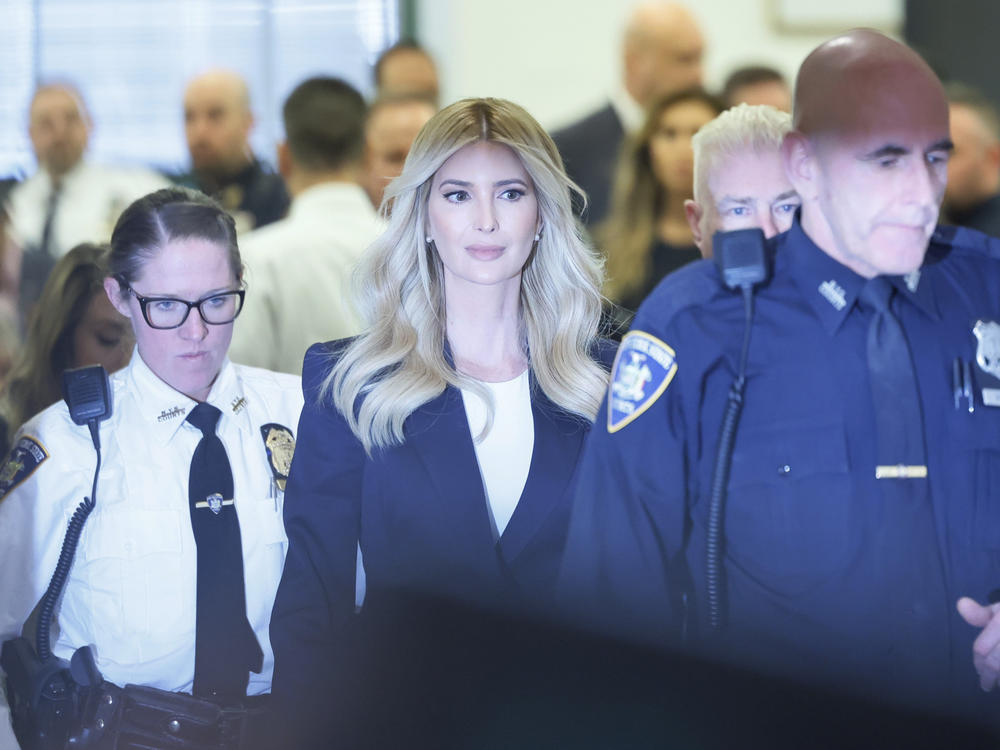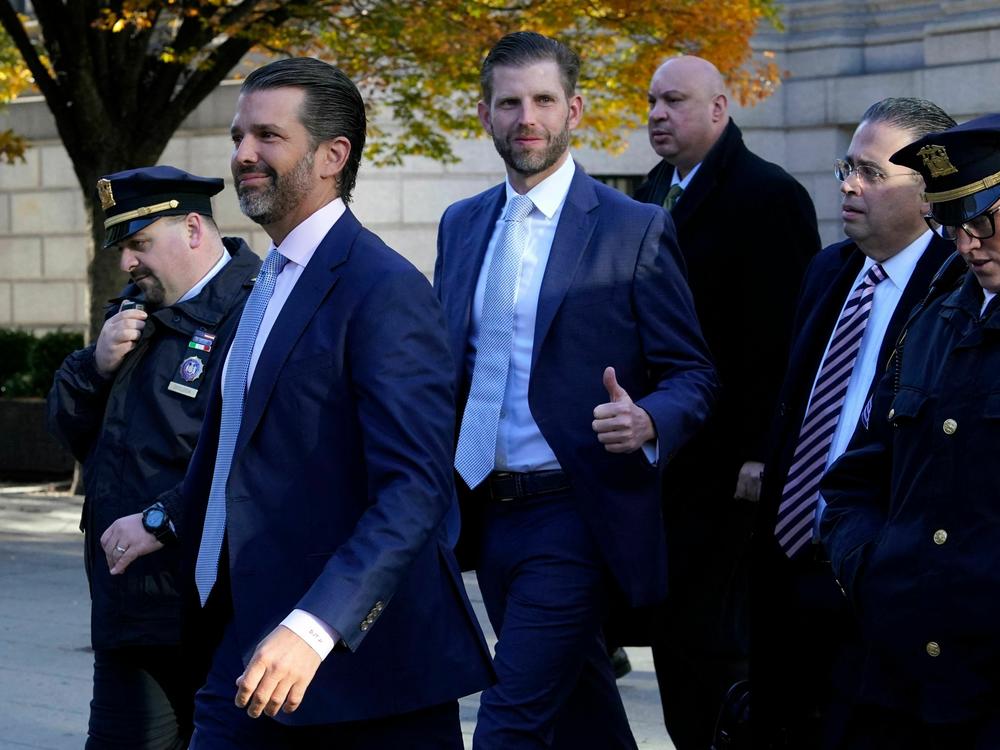Section Branding
Header Content
Ivanka Trump testified in former President Donald Trump's civil fraud trial
Primary Content
Updated November 8, 2023 at 6:19 PM ET
Ivanka Trump's testimony before a New York judge Wednesday offered a glimpse into the strategy former President Donald Trump's legal team could deploy as they begin their defense in the case.
Jesus Suarez, one of the attorneys in the Trump legal team, conducted her cross-examination, making her the only Trump family member who was questioned by the defense.
Suarez asked Ivanka Trump if she was personally responsible for submitting, preparing, reviewing or approving the financial statements. To all, Trump answered no.
But Suarez also asked her about what interactions Trump Organization executives may have had with members of Deutsche Bank, one of the financial institutions that received financial statements from the Trump Organization that have already been ruled fraudulent.
"They were very happy," she said, of the bank's reactions to finished projects.
She also said they thought the Old Post Office in Washington, which for a time was the Trump International Hotel, was the "crown jewel" of their investment portfolio.
The pattern of questioning by the defense — which sought to establish the fact that no financial institution or anyone else suffered because of the Trump Organization's deals — could be how the defense makes the case that not only did Trump's actions harm no one, banks benefited from them.
The former president has often argued that he has done nothing wrong, adding that banks and buyers he dealt with were happy with the negotiations and final results. He argued it's not a crime because there is no victim. But under New York law, lying isn't allowed in business, even if no one was harmed.
Indeed, the state attorney general's lawsuit argues that the manipulating of numbers to inflate or deflate net worth for financial gain is a crime.
Trump, the elder daughter of the former president, is not a defendant in the case. She was called to the witness stand to answer questions regarding fraudulent financial documents filed by the Trump Organization.
"She clearly was involved in negotiating and securing loans, favorable loans, for the benefit of the Trump Organization, for Mr. Trump, for her brothers and for herself," said state Attorney General Letitia James outside the courtroom. "At the end of the day, this case is about fraudulent statements of financial condition that she benefited from."
Ivanka Trump is expected to be the last witness called by the state attorney general's legal team in the civil fraud trial that will determine the penalties faced by other members of the Trump family.
She had been the executive vice president of development and acquisitions at the Trump Organization. During questioning led by AG lawyer Louis Solomon, Trump was asked about her knowledge of her father's statements of financial conditions.
"Not that I am aware of," she said.
Trump was also asked by the attorney general team about her involvement in executing the purchase of the Trump National Doral property in Miami. The attorney general's lawsuit alleges that Donald Trump's inflated statements were used to secure a $125 million loan from Deutsche Bank and were regularly submitted to the bank to fulfill Donald Trump's financial reporting requirements as guarantor on the loan.
She testified that she didn't recall if the bank asked for the statements or if she offered them.
The former president has been accused by James of being a part of a scheme that involved inflating or deflating the value of assets in order to secure better business, insurance and banking deals between 2011 and 2021. Trump's two older sons, Donald Jr. and Eric, are also defendants in the lawsuit. Judge Arthur Engoron has already ruled that Trump is liable of fraud.
Several months ago, Ivanka Trump's attorney successfully argued that any related actions Ivanka had at the Trump Organization happened before the statute of limitations kicked in.
Outside the courtroom, James argued that Ivanka Trump personally benefited from the inflated financial statements, even as she stepped away from the Trump Organization.
Donald Trump's legal team is expected to begin their defense next week, with the goal of being done by mid-December.
Ivanka Trump is the last in her family to testify
Earlier this week, Engoron heard testimony from the former president himself.
Trump argued he was responsible for providing information to the accounting firm Mazars, which compiled the statements. While answering questions, Trump took jabs at Engoron, James and the trial. He took long tangents when answering questions, which annoyed Engoron, called James a "political hack," and said he thought the trial was unfair.
Throughout his testimony Monday, Trump argued that even the financial statements were conservative estimates of the value of his properties and that he relied on others to compile the statements. Still, he did acknowledge that he had a hand in reviewing some of the final numbers in the valuations.
Eric Trump and Donald Trump Jr. are both executive vice presidents of the Trump Organization and held key leadership roles during the time their father was president.
Eric Trump at first denied having "anything to do" with the statements of financial condition. But the court was shown email correspondence between Trump and then-controller of the Trump Organization Jeffrey McConney (now co-defendant), in which Trump was asked to review and provide input on the statements and properties in the statements. Trump told the court he relied on others to ensure the statements were accurate, even if the court documents show he was privy to the process.
His brother Trump Jr. had a similar testimony. When asked directly by Engoron if he had anything to do with statements of financial condition issued by the Trump Organization, Trump Jr. said no, although he was responsible for the statements, according to documents shown in the trial.
Throughout his testimony, Trump Jr. said also he relied on others, such as co-defendant and former Trump Organization chief financial officer Allen Wesselberg, to vet the statements of financial condition.
McConney and Weisselberg have also already testified.
Copyright 2023 NPR. To see more, visit https://www.npr.org.




